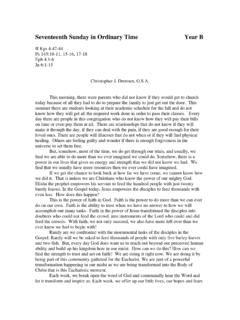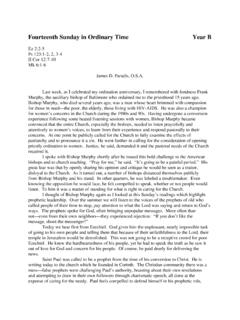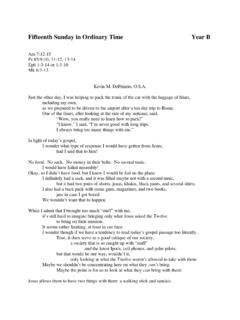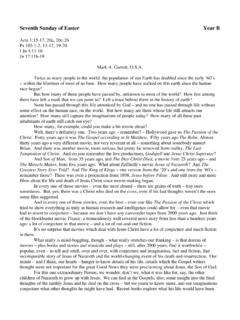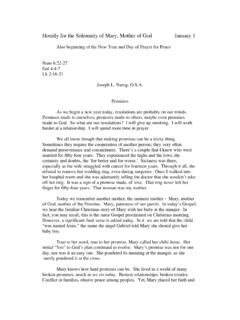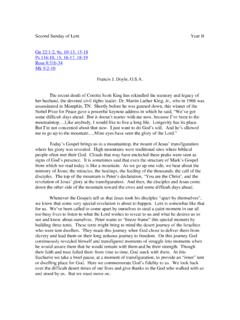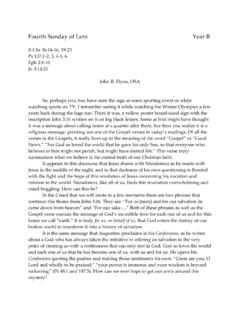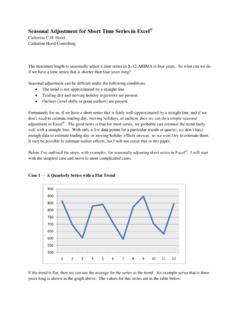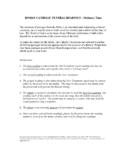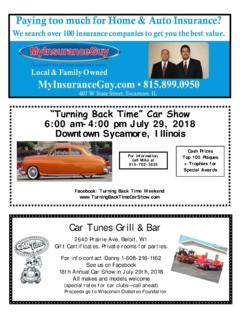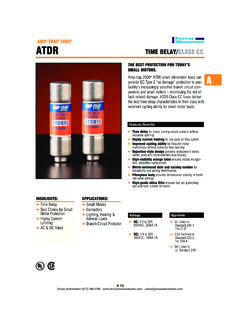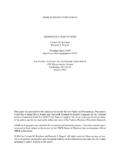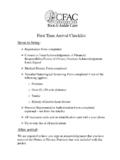Transcription of Second Sunday of Ordinary Time Year B
1 Second Sunday of Ordinary time year B. I Sam 3:3-10,19. Ps 40:2, 4, 7-8, 8-9, 10. I Cor 6:13c-15a, 17-20. John 1:35-42. Francis J. Caponi, Which are more important: words or actions? Many common sayings seem to suggest that words are unimportant, that deeds are what really matter. We say, Actions speak louder than words, and He's all talk and no action. As children we learn the saying, Stick and stones may break my bones but names will never hurt me. In movies and on television, we hear people issue the challenges, You talk the talk, but can you walk the walk? , and Put your money where your mouth is.. But every person here today can think of words you would pay hard cash to buy back.
2 Words hurled in anger, cruel gossip someone overheard, a stupid joke that left a scar on someone's memory, a schoolyard taunt that left a classmate in tears, a lie told to a trusting friend. Is there an adult here who can not recall a handful of such words, words you desperately wish you could reclaim? And every adult here today can think of words you would give part of your soul to have the chance to say. Words of apology to lost friends, words of gratitude to dead parents, words of forgiveness to a child and words of love to a spouse. For many of us, regret for what we left unspoken far outweighs shame over what we said. Is there an adult here who can not recall a dozen such unspoken words, words you would bleed for the chance to speak today?
3 Actions are important, but our experience teaches us that words are, too. Each have their place in a mature life, each play a role in the Christian calling. Sometimes, of course, there is nothing to say, and so silence is best. What can you really say to parents who have lost a child, to a spouse who has been betrayed, to a friend who has been told there are no medical treatments left to try? At such times, we speak a few words, some straws of consolation, some wisps of comfort, but we know that standing there by the side of our suffering friend is the best we can do. But sometimes, something must be said, and so silence is wrong. President Lincoln needed to go to the cemetery at Gettysburg, but he also needed to speak, and his words have moved countless hearts since that day.
4 If our family is attacked, our friends ridiculed, our religion slandered, shall we say nothing? When we see injustice, should we not cry out? So it is with today's gospel. Action and words both have their place. There is Jesus walking by. He isn't speaking, he's just walking. Who is he? Is he important? He doesn't appear special, he doesn't look significant. But then John the Baptist speaks: Look! There is the Lamb of God! And the two disciples with John hear this, and they begin to follow Jesus. John's words are so effective that his disciples leave him to follow someone else. Without those words, Jesus would have walked by and John's disciples would not have followed.
5 One of those disciples was Andrew. After spending some time with Jesus, what is the first thing he does? He goes and finds his brother, Peter, and tells him, We have found the Messiah.. And because of Andrew's words, Peter acts. Peter leaves everything behind and follows Christ. Because of Andrew's words today, many years hence Peter will suffer and die for the sake of Jesus Christ. Nothing in Peter's life is the same because of his brother's words, We have found the Messiah! Nothing in human history is the same because of how Peter acts on those words. Peter hears those words, and he acts upon them, and the world moves closer to God. We are called upon to do the same: to point Christ out to people, as John and Andrew did.
6 We who already follow Christ must proclaim to others, We have found the Messiah! . There is a mighty challenge here for all of us. If we are honest, the only time many of us speak Christ's name outside of a church is when we stub a toe, get cut off in traffic, or watch our favorite team make a bad play. As Christians, we bear Christ's name, but we barely use his name. Parents will discuss drugs and sex with their children, but not Jesus Christ. Married couples will share the most intimate and treasured parts of their lives with one another, but not read the Bible togther. Friends will talk about money, politics, and sports, but never mention the Lord. We don't want to be thought of as one of those strange people who talk about religion in public.
7 And so we restrain our lips, we do not speak of the Lord's justice, we tell hardly anyone about the mercy and goodness God has shown us. We come and celebrate this sacrifice each week, and speak the Lord's name within these walls, but the rest is silence. How can we meet the challenge, how can we obey the command of the Lord to spread the Good News? We don't need to stand up on soapboxes, or pester people at work, or start conversations with the question, Have you accepted Jesus Christ as your personal Lord and Savior? Those things make me uncomfortable, and they are not what I am suggesting. Rather, we have it within our power - like the prophets Samuel and John, like the apostles Peter and Andrew - to speak words that will change people's lives.
8 And we don't need to go out looking for those people. The people who need to hear those words aren't strangers. Like the brothers Andrew and Peter, we know them already. A friend struggling with addiction needs to hear us say, Turn your life over to Jesus Christ. A married couple coming apart at the seams needs to hear us say, Turn your life over to Jesus Christ. The young child starting out, the lonely teenager, and the struggling parent, all need to hear us say, Turn your life over to Jesus Christ.. That's the start. And when they ask us, How? , we make these words effective with our actions. We bring them to church, hand them a Bible, teach them to say the rosary. We invite them to dinner, introduce them to friends, give them the priceless gift of our own time as they talk and argue and cry.
9 We pray for them, light a candle, give them a prayer card of their patron saints. We hand them the schedule for confessions, drive them to a treatment center, encourage them to make a retreat, get them to a parish mission. We take a walk with them after dinner, or meet for coffee before work, or sit by their hospital beds. We make them laugh when we can, dry their tears when we must, and so let the Holy Spirit work through us. That is what the Lord wants: disciples who say the right things and do the right things, who both proclaim his word and imitate his example, who offer a sacrifice of praise to God and a sacrifice of time to those in need. Christ doesn't want our actions to speak louder than our words.
10 He wants them both loudly to proclaim the same thing: We have found the Messiah!.
